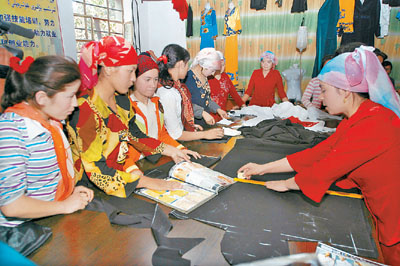Xinjiang Youth to Benefit from WB Financing of Vocational Education
chinagate.cn, June 1, 2015 Adjust font size:

Nearly 49,000 young people in the Xinjiang Uygur Autonomous Region will benefit from better technical and vocational education and employment opportunities through a project supported by a $50 million loan approved by the World Bank Group Board of Executive Directors.
Xinjiang, located in northwest China, has the largest geographical area in the country, with 47 ethnic minority groups accounting for over 60 percent of its population. Despite progress in the past few decades, Xinjiang’s economic growth rate and per capita gross domestic product are still lower than the national average. The Xinjiang Technical and Vocational Education and Training Project will help improve workforce quality, a key measure of development, by helping students in five schools gain skills demanded by the labor market.
“This project will improve the capacity of the project schools to deliver quality and relevant educational and training programs. We aim to help strengthen the technical and vocational education and training system in Xinjiang and make it more coordinated, equitable and effective,” said Liping Xiao, the World Bank’s Senior Education Specialist and the project’s task team leader.
The project, to be implemented in the next five years, will promote the collaboration between schools and industries, developing competency-based curricula and shifting from the traditional, teacher-centered methodology to a student-centered one. It will also help build high-quality teaching and management teams and upgrade school facilities and equipment.
The project also will support policy research and knowledge-sharing activities that go beyond the five project schools. For example, each project school will take on one or more non-project schools and support them through teachers training, curricula development and management improvement. Policy research and survey will be carried out to identify good practices and help build a modern technical and vocational education system in Xinjiang.
About 48,500 students, most of them from rural or poor households and 44 percent from ethnic minorities, are expected to benefit directly from the project. In addition, the project schools will offer short-term training programs to rural farmers and urban migrant workers and provide technical services to local communities and enterprises.
This is the fourth technical and vocational education and training project that the World Bank has supported in China since 2007, built on the results from the Bank’s policy study on Xinjiang technical and vocational education system and the experience gained from previous projects in Guangdong, Shandong, Liaoning and Yunnan Provinces in China.